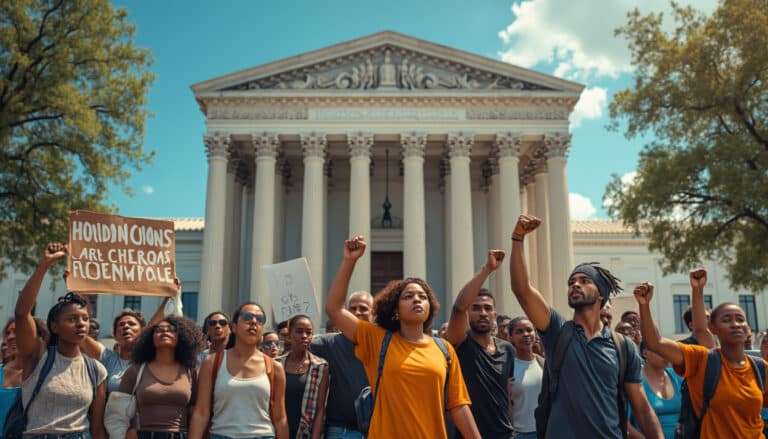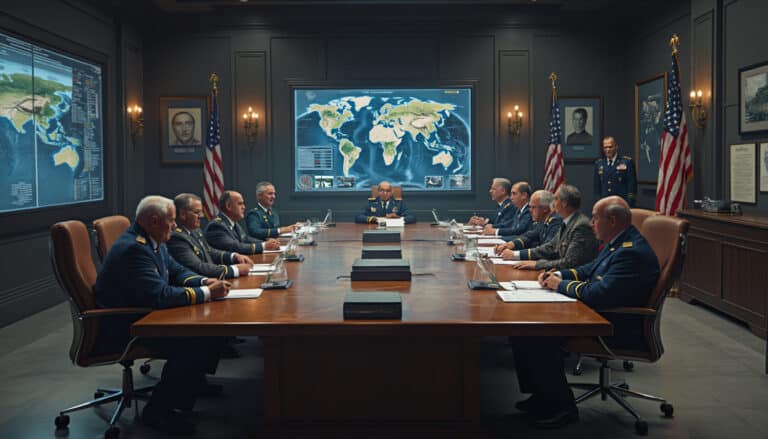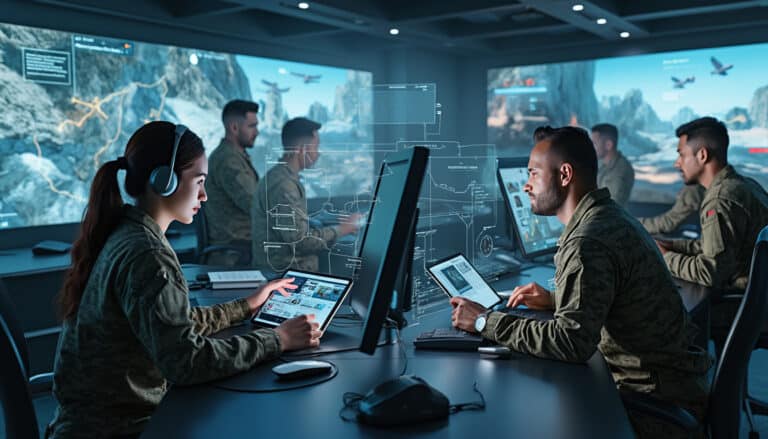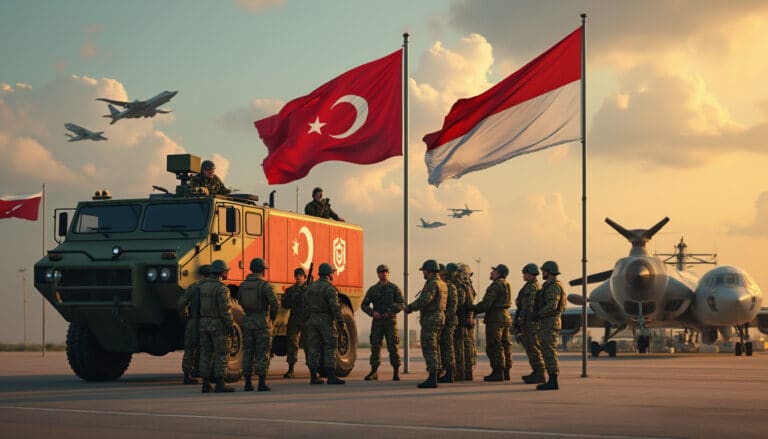The stability of Nigeria is once again under threat.More than thirty military and police personnel have been arrested.These arrests follow serious accusations of arms trafficking.
In a decisive move, Nigerian authorities have taken strict measures against those who allegedly diverted arms from military reserves to sell them to armed groups. This initiative comes amid a context where the country has been struggling for over fifteen years against a jihadist insurgency in the northeast, while managing other regional conflicts. Spokesperson Ademola Owolana stated that the operation, launched in August 2024, responds to the incessant cases of theft of arms and ammunition. Among those detained are not only military personnel but also civilians, including a traditional leader. The networks involved are believed to have facilitated the supply to groups such as Boko Haram and the Islamic State of West Africa Province (ISWAP), thus enhancing their offensive capabilities. This resurgence of jihadist attacks, notably raids targeting military bases, has alarmed security forces and international analysts. According to research, the seizures during these raids provide up to 20% of the arms used by terrorist groups in the Sahel region.

The security situation in Nigeria is further complicated by the recent arrest of more than thirty military and police personnel accused of selling arms to armed groups. These arrests occur in a context of violent internal conflict, marked by a jihadist insurgency of over 15 years in the northeast, conflicts between farmers and herders in the central-north region, a secessionist agitation in the southeast, as well as a resurgence of kidnappings for ransom in the northwest.
Table des matières
ToggleWhat are the motivations behind these arms sales?
According to the military spokesperson, Ademola Owolana, this operation was launched in August 2024 as a response to the incessant thefts of ammunition and arms within military stocks. “Some soldiers motivated by the codicil got involved in the racketeering of ammunition, intentionally diverting arms from military reserves to terrorist groups,” he stated at a press briefing. This internal corruption weakens not only national defense capabilities but also fuels armed conflicts by supplying arms to insurgents.
The motivations behind these acts can be multiple. The lure of quick profits drives some military and police personnel to engage in illegal activities, exploiting their position to easily access arms. Additionally, the weakness of certain command links and the lack of rigorous oversight facilitate these offenses. The precarious economic situation in some regions of Nigeria may also prompt individuals to seek supplementary income, even through illegal means.
What impact do these arms diversions have on national security?
The diversion of arms by corrupt military and police personnel exacerbates the already complex security crisis in Nigeria. By supplying arms to armed groups such as Boko Haram and the Islamic State in West Africa (ISWAP), these illegal sales strengthen their arsenal and enable them to carry out more frequent and violent attacks.
According to a study by Conflict Armament Research based in the United Kingdom, raids on military bases have provided jihadists in Sahel countries with about 20% of their arms. This proliferation of small arms not only increases the capacity of armed groups to continue their terrorist activities but also complicates the efforts of security forces to neutralize them.
As a result, the civilian population is constantly exposed to an increased risk of violence. Families live in constant fear of attacks, kidnappings, and extortion, which further deteriorates living conditions in many regions of the country. Trust in security institutions diminishes, complicating conflict management and peace initiatives.
How is the Nigerian government responding to this crisis?
In response to this crisis, the Nigerian government has implemented several measures to combat corruption and strengthen national security. The operation launched by the military in August 2024 demonstrates a willingness to address arms diversions and illegal sales. In addition to arrests, thorough investigations are being conducted to identify and sanction all those responsible for these offenses.
The government is also working to enhance oversight of weapon stocks and improve internal controls within the armed forces and police. Training on ethics and accountability is being established to prevent corruption and raise awareness among officers about the consequences of their actions on national security.
Furthermore, efforts are being made to collaborate with international and regional organizations to combat arms trafficking. Partnerships with agencies like the UN and the African Union allow for information sharing and coordination of actions against arms trafficking networks. However, these measures require time to produce tangible results and restore citizens’ trust in state institutions.
What challenges lie ahead for ensuring lasting peace in Nigeria?
Ensuring lasting peace in Nigeria requires a multidimensional approach and effective coordination among various stakeholders. One of the main challenges is tackling corruption within the security forces. Without complete transparency and strict accountability, efforts to reduce arms trafficking will remain insufficient.
Moreover, it is crucial to address the root causes of conflicts, such as intercommunal tensions, economic inequalities, and social injustice. Development and reconciliation programs must be established to ease divisions and provide alternatives for vulnerable populations prone to joining armed groups.
Additionally, international cooperation plays a key role. Initiatives like the suspension of British fighter jet deliveries to Israel, called for by human rights groups, highlight the importance of regulating the arms trade at a global level (source). Similarly, sanctions imposed by China on two American companies for arms trading with Taiwan underline the need for strict international controls (source).
The role of international institutions
International institutions can provide crucial support in terms of training, resources, and coordination of anti-trafficking efforts. Initiatives like the Bluffton 2024 Arms and Knives Show create networks for dialogue and collaboration among countries to share best practices and develop common strategies to combat arms proliferation.
What are the effects on the civilian population?
The consequences of arms diversions and arms proliferation have a devastating impact on the Nigerian civilian population. Frequent attacks by armed groups create a climate of fear and perpetual insecurity. Many communities live in constant fear of raids, kidnappings, and extortion, leading to a deterioration of living conditions and a massive exodus of populations to safer areas.
Essential infrastructure such as schools, hospitals, and roads are often destroyed or made inaccessible, hindering socio-economic development. Education is particularly affected, with many children forced to leave school to flee conflict zones or to participate, under duress, in the activities of armed groups.
Furthermore, the psychological trauma of living in a war zone profoundly affects individuals, especially young people and women. Reconstruction efforts must include psychological support and reintegration programs to help survivors rebuild their lives and regain a sense of normalcy.
What are the future prospects for Nigeria?
Despite considerable challenges, there are prospects for improvement in Nigeria. Reforming security forces, enhancing governance, and the ongoing fight against corruption are essential to restore citizens’ trust. Additionally, dialogue and reconciliation initiatives with affected communities can help ease tensions and promote peaceful coexistence.
International support, through partnerships and funding, is also crucial to strengthen Nigeria’s capacity to manage its security issues. Projects aimed at improving infrastructure, providing economic opportunities, and promoting education can help reduce poverty and inequalities, thereby decreasing the incentives to join armed groups.
In conclusion, combating the illegal arms trade and strengthening national security require a concerted and sustainable approach. Nigeria must continue to strengthen its institutions, promote transparency and accountability, and collaborate with the international community to ensure lasting peace and a safer future for all its citizens.
For more information on developments related to international security and arms regulation, please also consult the call from human rights groups to the Court, the sanctions imposed by China, and stay informed about events like the Bluffton 2024 Arms and Knives Show.
🔴Vente d'armes à Israël ➡️ "La France n'exporte pas d'armes en Israël, elle exporte des pièces détachées qui sont intégrées dans les systèmes qui eux-mêmes sont exportés“, décrit Roland Lescure. pic.twitter.com/b87zlSeq35
— franceinfo (@franceinfo) March 27, 2024






















